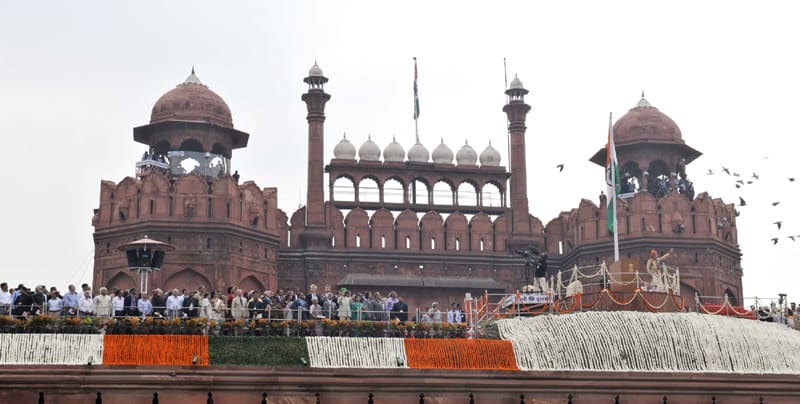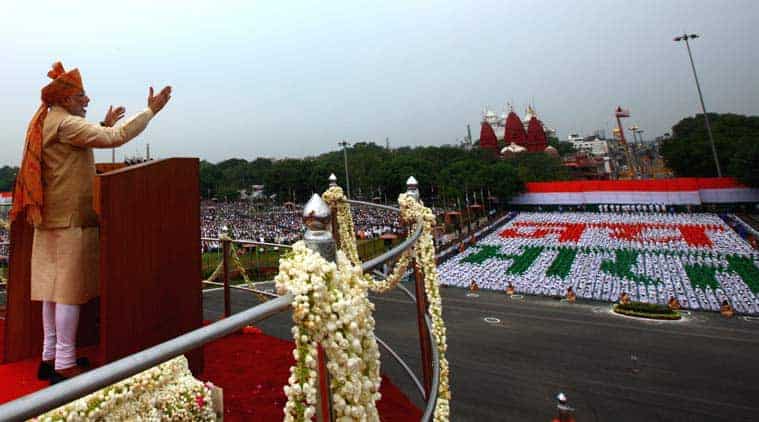Independence Day began with the TV blaring much earlier than usual in the morning at several homes, as it usually does every year, when the upbeat Modi fans and some of the plainer, curious souls like me were unable to catch the Prime Minister upfront at the Red Fort. So we resorted to half-heartedly watching him live on our personal screens in the end. For me, at least, a smattering of vibrant saffron, that colour which has taken on a furious new meaning in the past year, came to overshadow the ‘red’ in the Red Fort this time. And so the speech began. In a typical, conciliatory fashion, the Modi-esque rhetoric was employed as if to simmer the heat under all burning issues. “Bharat jodo (connect India) should be a popular slogan”, he said, like Bharat Chhodo (Quit India). International problems and Kashmir and the Goods and Service Tax and everything in between, including the staggering ‘natural calamity’ at Gorakhpur, were quickly addressed and laid aside like sizzling meat off the grill. The speech was careful not to delve into any topic in too much detail. One got the sense that there was much to say and too little time. But a singular theme kept reverberating over and over — digitisation.

Should the word ‘digitisation’ bother me and you?
As a student, my ears perk up almost by some innate instinct at words like ‘technology’, ‘digitisation’, ‘Digital India’, ‘science’, ‘demonetisation’, ‘Internet’, etc. which get thrown about in the air casually like playthings these days. This 15th of August proves just how far we have come in our journey of naturalising these terms and carving out a space for them into our everyday lives. These are also the terms we take forward into our new dictionary, stepping into the P.M.’s ‘New India’ of 2022. One does not stare at his or her phone, look at the plethora of payment-making apps, and go ‘Oh!’ anymore. Tapping on smartphones comes naturally to us millennials, and the government plans to utilise this trait of ours to the max. We leave a stylish impression on the global platform – that the India paraded in front of the United Nations and elsewhere is fun, hip, and keeps up with the times. The truth is slightly more complicated.
For every new word having to do with digitisation, which this Independence Day speech embeds in our minds, there are several others which get replaced without a whisper. One of these major terms is ‘education’. Precisely for this reason, the new words bother me to no end, especially since I happen to hail from a minority — my loyalties lie, unconventionally, with the Humanities. When the P.M. talks of the ‘Badal Sakta Hai’ (It Can Change) attitude in this country, I know that it cannot stand the test of time where the education system is concerned. Forget about change, education does not even score a hit in his speech. It finds no mention. As university students, what should make sparks fly in our minds are not those claims and promises which the speech consciously makes, but rather the things he leaves out. God is in the details. And if anything, the recent case of changing the content in the History textbooks of Maharashtra is but a miniscule example of how rotten the macrocosm under the current government is. What about the plight of ad-hoc lecturers in universities? Why were there even talks of shutting down centres, including that of Women’s Studies, in the Tata Institute of Social Sciences? What about the lack of funding in the University of Delhi and cutting down of seats in our universities? What about the Vice-Chancellor of Jawaharlal Nehru University requesting that an ostentatious military tank be placed within the campus? What about the lack of job prospects?
It makes me believe more and more that we are scared of educated citizens and the Humanities somehow. Politicians avoid talking about it on the national platform because it is that one field which can blow the lid off of human injustice. It is also the most effective weapon with which to target the shortcomings of governments. Yet, I am a student and a girl child who will manage to have received a university degree by 2018 — nothing short of a mean feat in itself, especially in India — and I can attest to the fact that the P.M.’s Digital India will crumble into a heap of ignorance, violence, and atrocities without the basic foundational pillar of that very education.
Education swatted away like a fly on the windshield
When the P.M. says, ‘Our resolve is to build a New India by 2022’, it is very clear that he targets a certain section of the population which is blind enough to the state of education or uneducated itself so much so that it gulps down the speech without a pinch of salt. That leaves out university spaces, and unfortunately for students of the Humanities, me and you. Even if I had an orientation towards the I.T. or banking or all those wonderful sectors that the P.M. always chooses to focus upon selectively, the latest International Labour Organisation findings point to the fact that I might still be staring dead into the face of unemployment.
Right from school, we are exposed to a toxic mix of jingoistic patriotism, saffronisation, disregard for any subject other than the Sciences, and then a complete disregard for university spaces: unfortunately, this will be the India of 2022 if careful attention is not paid. And I, for one, sincerely believe that though India may be ready to ‘tackle any kind of change’, this is not the one on anybody’s mind.
Jai Hind!
Image Credits: Indian Express
Deepannita Misra
[email protected]





Comments are closed.